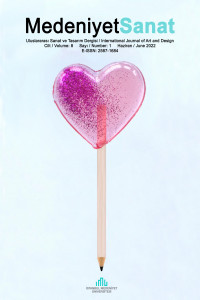Aristoteles’in Poetika’sı Işığında Sofokles’in Filoktetes Tragedyası
Aristoteles, Poetika, Sofokles, Tragedya, Eylem
Sophocles's Tragedy of Philoctetes in the Light of Aristotle's Poetics
___
- Arıcı, O. (2020) Kurmacanın İnşası, İstanbul: Habitüs Yayıncılık.
- Aristoteles (2005) Poetika, N. Kalaycı (çev.). Ankara: Bilim ve Sanat Yayınları.
- Aristoteles (2016) Poetika, A. Çokona; Ö. Aygün (çev.). İstanbul: İş Bankası Yayınları.
- Barba, E. (2002) Oyuncunun Gizli Sanatı, A. Candan (çev.). İstanbul: Bilgi Üniversitesi Yayınları.
- Cevizci, A. (2017) İlkçağ Felsefesi, İstanbul: Say Yayınevi.
- Cullan, A. (2016) Aristotle and the Poetics, New York: Routledge Publishing.
- Latacz, J. (2006) Antik Yunan Tragedyaları, Y. Onay (çev.). İstanbul: Mitos Boyut Yayınları.
- Nutku, Ö. (1985) Dünya Tiyatrosu Tarihi, İstanbul: Remzi Kitabevi Yayınları.
- Sofokles. (1941) Filoktetes, N. Ataç (çev.). Ankara: Maarif Vekilliği Yayınları.
- Sofokles. (2006) Filoktetes, Ş. Yücel (çev.). İstanbul: Mitos Boyut Yayınları.
- Şener, S. (1998) Dünden Bugüne Tiyatro Düşüncesi, Ankara: Dost Kitabevi Yayınları.
- Şener, S. (1997) Yaşamın Kırılma Noktasında Dram Sanatı, İstanbul: Yapı Kredi Yayınları.
- Vernant, J.P. (2002) Yunan Düşüncesinin Kaynakları, H. Portakal (çev.). İstanbul: Cem Yayınevi.
- Yücel, V. (2014) “Aristoteles’in Poietikas’sı-Toplumsallaştırıcı Anlatı”. Cogito, 77 (352-364).
- Yayın Aralığı: Yılda 2 Sayı
- Başlangıç: 2015
- Yayıncı: İstanbul Medeniyet Üniversitesi
Cami Mekânlarında Su ve Bir Algı Unsuru Olarak Müstakil Su Ögeleri
Gamze TAYILGA, Sibel DEMİRARSLAN
Seramik Sanatında Katılımcı İzleyici ve Eser Çözümlemeleri
Hilal ÇINAR, Pınar ÇALIŞKAN GÜNEŞ
Aristoteles’in Poetika’sı Işığında Sofokles’in Filoktetes Tragedyası
Çocuk ve İlk Gençlik İllüstrasyonunda Korkunun Görünümleri
Ingeborg Bachmann’ın “Manhattan’ın İyi Tanrısı” Oyununun Trajedi Teorisi Bağlamında İncelenmesi
Film ve İzleyici İlişkisi Bağlamında Anlam Yaratımına Yönelik Bir Araştırma
Cemre Su AYDIN, Nilüfer PEMBECİOĞLU
Teknolojik Bir Aygıt Olarak Kameranın Keşfi ve Sinemanın Doğuş Döneminin İncelemesi
Resimli Kitaplarda Tipografi Kullanımı: Okunaklılık ve Okunabilirlik Üzerinden Bir İçerik Analizi
Şimdi ve Gelecek için Farkındalık Yaratıcı Çevreci Belgesel Filmler
Buluntu Mekânların Seramik Malzeme Kullanılarak Yeniden İşlevlendirilmesi
